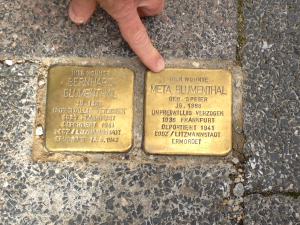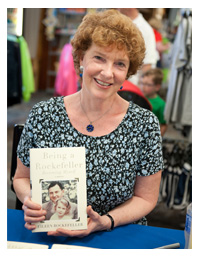Paul and I have spent the past two weeks in Germany on a roots trip. Happily, our eldest son, Adam, came for part of the time too. Our first stop was Baden-Baden, a beautiful town in the south, known for its mineral baths. It has been a gathering place for artists since the early 19th Century.  We began there because I was invited to be on a German TV game show in Baden-Baden. This is a first for me, but I couldn’t resist the free round trip with two nights at a hotel and a driver to take us to and from the airport! I guess you could say I felt like a Rockefeller!
We began there because I was invited to be on a German TV game show in Baden-Baden. This is a first for me, but I couldn’t resist the free round trip with two nights at a hotel and a driver to take us to and from the airport! I guess you could say I felt like a Rockefeller!
The TV host claimed that the Rockefellers come from Germany. This is only partially true, for the family is also traced back to the name of Rochefeuille, (or rock leaf) in France, but since I was in Germany I didn’t disavow him of his claim! He later told me, “I like the Rockefeller’s much more than I expected to!” I don’t know what he meant but at least I did not fail as an ambassador for my family. One of the other guests was the grand nephew of Mother Theresa, a very different heritage, yet we both were imbued with the value and meaning of service.
In Baden-Baden we had just enough time to walk along the river and see a few art exhibitions before moving north to towns where Paul’s family had lived. His mother, Ursula, was born in Dusseldorf, Germany and grew up in Cologne until her father foresaw the growing threats of the Nazi Regime and emigrated shortly before WWII, first to Holland and then the U.S. She vividly remembered visiting her grandparents in Nordhausen, a city of about 51,000 today, located in what became East Germany after WWII.
In preparation for our visit, Paul contacted the mayor of his grandfather’s town, Kelsterbach, located next to the Frankfurt International Airport, and also a retired Mayor from Nordhausen who has written a book on the history of the Jewish experience there. Paul asked both men if we could meet them to learn more about their towns’ histories. To my surprise the three mayors not only greeted us personally, but also planned meetings for us variously with the town archivist, historians, and journalists who wrote articles about our visit. I was not prepared for how important it was to them that Paul wanted to return to a place where guilt still lingers almost 70 years after the Holocaust. This became evident in the hours they spent with us.
In Kelsterbach, Mayor Manfred Ockel showed us brass tiles, called “stumbling stones,” embedded in the streets in front of homes where Jews killed in the Holocaust had lived. Created by a German artist, these tiles have been ceremoniously installed throughout Germany. Each tells the name of a Jew who lived there, when and where they were deported, and the dates and locations of their birth and death, if known. We found the names of Paul’s grandfather’s sister and her husband, Meta and Bernhard Blumenthal, and of his great grandmother as well.
In Nordhausen, we met the former mayor, Manfred Schröter, a retired doctor. He magnanimously spent a full day with us, arranging first for us to visit with the current Lord Mayor Zeh, two of his staff and two journalists. Herr Schröter then drove us in the Mayor’s car to the nearby memorial museum and remains of the Mittelbau-Dora concentration camp through which passed 60,000 prisoners from 21 countries between 1943 and 1945. While only 6% were Jews, the conditions for all were so horrific that I am still feeling the reverberations. I was struck by how the beech trees beside the crematorium, fertilized long ago by the ashes of victims, today have grown large, and stand as mute witnesses to the horrors there.
The question that occurred to me going forward is, “what is most life-affirming?” Paul and I are considering how we might make a contribution to Nordhausen to help the youth of today appreciate diversity. We can’t recover what was lost and regretted, but we can go forward with an aim to heal, not only ourselves but also descendants of others involved. The co-creation with people in Nordhausen might form a kind of emotional alchemy.
What are your roots?
What needs to be healed?



This is very sobering, and very powerful. Thank you for sharing it. It is so important to remember what human beings have done, and continue to do to each other…and to find ways to heal and find a new path forward from these ancestral injuries and injuries to our common humanity. It is very powerful that they embedded these “stumbling blocks” in the streets. Thank you again for sharing all of this!
Dear Eileen, What a beautiful description of what must have been a remarkable time. I am so moved by the “stumbling blocks”, and your description of the beech trees. Thank you for sharing your thoughts and experiences!! Rebecca
First, thank you so much for your deep and thoughtful account of your trip. You write so well and had me laughing at times, sighing at times and inspiring historical remembrances of times past. Sounds like it was a meaningful and most enchanting visit. My Mother’s family are Austrian-Jews from Salzburg and emigrated here in the early 1900’s. Grandpa was a tailor, and Grandma worked hard, at home, raising their seven children. My Mom was the youngest girl (one other brother younger than Mom), and is the last survivor of the “Skulnick” family. Now, almost 96, she’s doing well in assisted living in Philadelphia. My Dad’s family hail from northern Italy, and came to America in the late 1800’s, settling in Hazelton, PA. I think I get my artistic bent and passion for life from both sides of my family. Tracing one’s roots is a wonderful idea. It gives us a sense of stability, understanding and compassion—for ourselves, our families and, especially, for others.
It sounds like a very moving journey. I’ve never hear of the “stumbling blocks” before: such concise and thoughtful consciousness raising tribute those lost to our past lack of humanity. I applaud your commitment to appreciation of diversity/differenc. So important.
Hi Eileen, Thank you for sharing your thoughts on your meaningful and interesting trip to Germany. One “builds to recover and heal”, don’t you think? I am trying to find a few doable projects for you to think about, as regards your philanthropic gift. I have reached out to a few individuals who might be able to help develop a few answers for you. Of course the “story telling” concept highlighted in one of the recent Rockefeller Foundation newsletter blogs to subscribers might be worth pursuing. And, Judith Rodin is, most likely, a wonderful person to consult with about your “gift” to Nordhausen.
It may be that I can help–hope so. Elaine
Dear Eileen, I enjoy so much reading your blogs, but this one touched me even more. very nice description oh whole trip I imagine how special it was for Paul following and finding out about his roots. as you know my roots are from republic of Georgia and living in America every day I am trying to do something to help to build virtual bridge between these two countries, which will bring me close to my roots. in the end you wrote about helping the youth of Nordhausen in some way…consequently one of my thought is connected to Georgian youth and even have some ideas. Maka
Dear Eileen, what I love most about this particular blog is that you and Paul, and Adam too, were engaged in a joint venture in seeking your respective ancestral roots…most touching to me. Akh, where to begin with my roots. My mother (Bella) was born in Russia (the eldest of 7) immigrating to the U.S. at age 8 with her parents and three siblings, where they settled on the outskirts of Newport, Rhode Island in Middletown. My grandpa (Beryl) had a dairy farm where they all lived and he was a very pious man who became the unofficial cantor at historic Touro Synagogue in Newport. My grandma (Eva) was born in Latvia, also Jewish–a very kind soul who opened her heart and home to any stranger grandpa brought home (she later had four more children). My dad, Jacob, was born in Iasi, Roumania and came to the U.S. at age 14 with his older brother. Both families were seeking relief from persecution for being Jewish. I have conducted some research through Ancestry.com….my mom always said that she came to the U.S. on the Titanic–of course, this became the family joke!! In fact, she came to the U.S. on the Teutonic from Bremerhaven, Germany!! Interesting and a bit sad for me is that our parents never spoke about their early years in Russia and Roumania and as adults they did not embrace their own Jewish roots. Their generation wanted to leave the painful past behind and embrace their new country (my father changed his name from Jacob Saul Gelber to Jacques S. Gilbert). So, in our case there is a large gap in knowing and knowledge of our ancestral roots….I am sleuthing to find out what I can. If you or Paul have any suggestions for my research, I shall be most grateful. It is no coincidence that I majored in Russian Language and Literature at the university—growing up, we had many Russian musician friends performing quartets/quintets with me curled up under the piano–a rich musical heritage! As for what needs healing—-in my case, the seeking itself is the healing. Take care, Louise
Your writing is brilliant. I feel honored to read your blog since every post is filled with humor, intelligence and inspiration. My family came from England two generations ago settling in New York and later moving to California. Our history is ‘milk toast’ compared to what your husband’s family and thousands of others endured and will forever. Thank you!!
Pingback: Putting One Foot in Front of the Other | Eileen RockefellerEileen Rockefeller